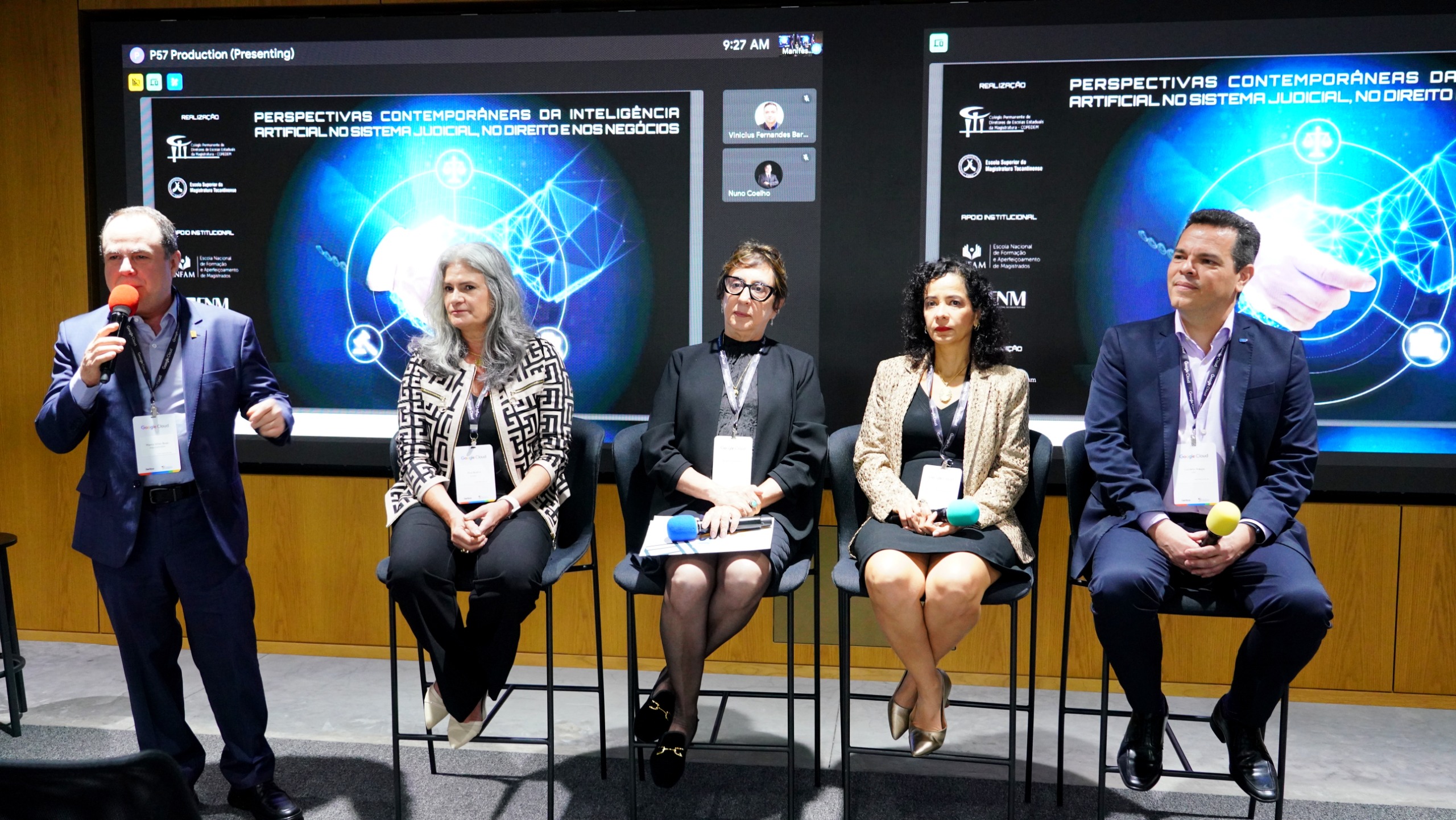
On Wednesday morning (7th), leaders and experts from Brazil gathered at the headquarters of Google in New York (USA) to discuss the impact of artificial intelligence (AI) on the Brazilian judicial system. The event, promoted by Google Cloud in partnership with the Superior School of the Judges of the State of Tocantins (ESMAT) and the Permanent College of Directors of State Schools of the Magistracy (Copedem), featured debates and lectures on the implementation of generative AI tools in the judiciary.
The event was opened with a welcome message from Milton Burgese, Vice President of the Public Sector in Latin America, Google Cloud, and the President of Copedem, Justice Marco Villas Boas.
In his speech, the Justice stressed the importance of generative AI in reducing procedural backlogs and providing a more efficient and secure dynamic in Brazilian courts, promoting human dignity. "The idea of using artificial intelligence in the Court of Justice of the State of Tocantins came about in the course of these training activities within the Superior School of the Judges of the State of Tocantins and we thought not about using the Chat of daily dialog of commands (prompts), but an Active AI tool that already had all the routines, instructions, contained within it, initially designed for the admissibility of appeals," he argued.
Hórus Project
The highlight of the morning was the presentation of the "Horus Project", focused on advanced studies on the use of generative AI in the Brazilian Judiciary. Moderated by Justice Ângela Issa Haonat, the panel included Ana Beatriz Pretto, Executive Director of Esmat, Ana Carla Bliacheriene, Coordinator of the SmartCitiesBR Research Group of USP, and Luciano Vieira de Araújo, Professor and Researcher in the same group. The event was also attended by Justice Pedro Nelson de Miranda Coutinho, President of the Intelligence Center of the Precedent Management Center (CINUGEP), of the Judiciary of the State of Tocantins, who moderated the panel on "Supplementary Pensions and the Disruptive World".
Justice Marco Villas Boas mentioned the origin of the name of the project, inspired by the Egyptian mythology, emphasizing the need for ethical and secure control of AI. "We are living with this dubious situation, where we have to live with the prospect of a lunar eye but we have to use the solar eye. That's why the choice, this artificial vision has to be subject to natural vision, an ethical control, safety in all aspects to allow us to move forward in this context," he said.
About the Hórus Project
The Hórus Project aims to develop innovative solutions with Active Generative Artificial Intelligence (AGI) to deal with the large volume of cases, provide comprehensive training for all institutional levels, promote a culture of innovation and the use of Active AGI in the judiciary, and optimize work processes. This initiative was developed and/or implemented by the Superior School of the Judges of the State of Tocantins (ESMAT-TJTO), the SmartCitiesBr Research Group of the University of the State of São Paulo, the School of Arts, Sciences and Humanities of the University of the State of São Paulo (EACH-USP), the Permanent College of Directors of State Schools of the Magistracy (COPEDEM) and the Taqui.ai startup. The team responsible for developing and implementing the project is made up of Justice Marco Anthony Steveson Villas Boas (ESMAT-TJTO), Professor Ana Carla Bliacheriene (USP) and Professor Luciano Vieira de Araújo (USP). The Horus Project uses cutting-edge technologies such as Generative AI (Gemini 1.5 Pro and Flash, ChatGPT 4) and cloud solutions (Google Cloud, Azure), as well as task automation and automatic document generation.




_thumbnail_thumbnail.jpeg)
_thumbnail_thumbnail.jpeg)
_thumbnail_thumbnail.jpeg)
_thumbnail_thumbnail.jpeg)
_thumbnail_thumbnail.jpeg)
_thumbnail_thumbnail.jpeg)
_thumbnail_thumbnail.jpeg)
_thumbnail_thumbnail.jpeg)
_thumbnail_thumbnail.jpeg)
_thumbnail_thumbnail.jpeg)
_thumbnail_thumbnail.jpeg)
_thumbnail_thumbnail.jpeg)
_thumbnail_thumbnail.jpeg)
_thumbnail_thumbnail.jpeg)
_thumbnail_thumbnail.jpeg)
_thumbnail_thumbnail.jpeg)
_thumbnail_thumbnail.jpeg)
_thumbnail_thumbnail.jpeg)
_thumbnail_thumbnail.jpeg)
_thumbnail_thumbnail.jpeg)
_thumbnail_thumbnail.jpeg)
_thumbnail_thumbnail.jpeg)
_thumbnail_thumbnail.jpeg)
_thumbnail_thumbnail.jpeg)
_thumbnail_thumbnail.jpeg)
_thumbnail_thumbnail.jpeg)
_thumbnail_thumbnail.jpeg)
_thumbnail_thumbnail.jpeg)
_thumbnail_thumbnail.jpeg)
_thumbnail_thumbnail.jpeg)
_thumbnail_thumbnail.jpeg)
_thumbnail.jpeg)
_thumbnail.jpeg)
_thumbnail.jpeg)
_thumbnail.jpeg)
_thumbnail.jpeg)
_thumbnail.jpeg)
_thumbnail.jpeg)
_thumbnail.jpeg)
_thumbnail.jpeg)
_thumbnail.jpeg)
_thumbnail.jpeg)
_thumbnail.jpeg)
_thumbnail.jpeg)
_thumbnail.jpeg)
_thumbnail.jpeg)
_thumbnail.jpeg)
_thumbnail.jpeg)
_thumbnail.jpeg)
_thumbnail.jpeg)
_thumbnail.jpeg)
_thumbnail.jpeg)
_thumbnail.jpeg)
_thumbnail.jpeg)
_thumbnail.jpeg)
_thumbnail.jpeg)
_thumbnail.jpeg)
_thumbnail.jpeg)
_thumbnail.jpeg)
_thumbnail.jpeg)
_thumbnail.jpeg)
_thumbnail.jpeg)
